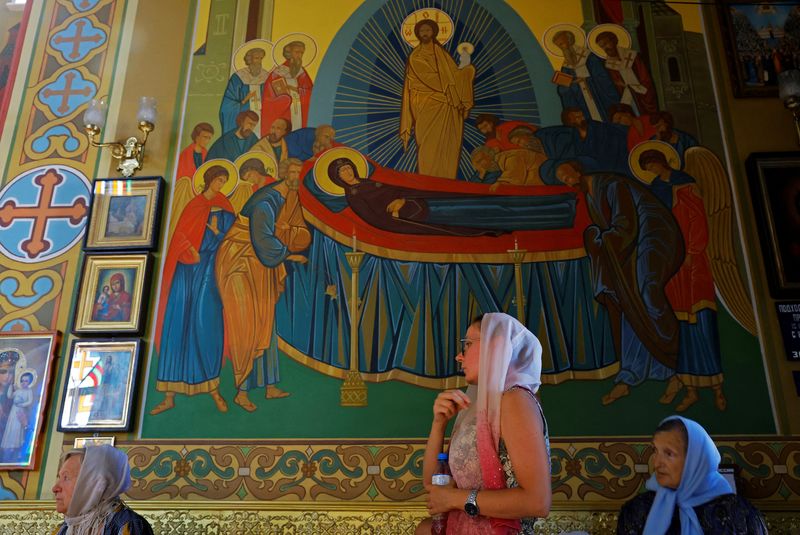MOSCOW (Reuters) -Speaking behind the thick white walls of Moscow's ancient Danilov Monastery, Archpriest Igor Yakimchuk is adamant: people must not be forbidden to pray in their chosen branch of Eastern Orthodox Christianity.
He speaks calmly but Yakimchuk is one of many Orthodox Christians in Russia who are angry about a law passed by Kyiv in August that targets a Russia-linked Orthodox church that long dominated religious life in Ukraine.
President Volodymyr Zelenskiy's administration accuses the Ukrainian Orthodox Church (UOC) of spreading pro-Russian propaganda in time of war and of housing spies, charges it denies.
Under the law, the Russian Orthodox Church itself was banned on Ukrainian territory and a government commission was tasked with compiling a list of "affiliated" organisations - expected to include the UOC - whose activities will be outlawed too.
"In the 21st century, in the centre of Europe, millions of people are being deprived of their basic civil rights," Yakimchuk, wearing a black cassock and a large Orthodox cross around his neck, told Reuters in an interview.
"Because what does it mean to ban a church, which is the largest religious denomination in Ukraine, no matter how much the current Ukrainian authorities would like to downplay its scale? Everyone understands perfectly well that it is impossible to forbid people to pray."
Whether the UOC retains the following it once did is disputed. An independent Orthodox Church of Ukraine (OCU) that was set up after Russia annexed Crimea in 2014 to be fully independent of Moscow has seen its popularity grow rapidly since President Vladimir Putin sent his forces into Ukraine in 2022.
Ukrainian authorities say the UOC is fair game. They have launched dozens of criminal proceedings, including treason charges, against dozens of its clergy. At least one has been sent to Russia as part of a prisoner swap.
CHURCH DIVIDED
However, Yakimchuk's denunciation of what he calls "absolute lawlessness" in Ukraine is a reflection of how the nearly 32-month war - which Moscow calls a "special military operation" - has divided Orthodox hierarchies in the two countries, even though they all adhere to Eastern Orthodox Christianity.
The UOC tried to distance itself from Moscow once the war was underway, condemning Russia's actions and removing references to the "Moscow Patriarchate" from its name.
But those attempts angered clerics in Moscow, who have thrown their weight behind what they cast as Russia's "holy war" in Ukraine against the expanding influence of what they see as a decadent, godless West. The UOC's efforts also failed to allay Kyiv's concerns about the church's activities and loyalties.
The process of shutting down UOC operations in Ukraine - something one Ukrainian lawmaker called "cleansing" - is likely to be lengthy and involve court battles but the church's days seem numbered. Some opinion polls suggest more than 80% of Ukrainians do not trust the UOC.
The Kremlin, which has forged close ties with the Russian Orthodox Church, has described Ukraine's new law as "an open attack on freedom of religion".
One Russian Orthodox priest in St Petersburg, Leonid Trofimuk, branded Ukraine's action as "Satanism" and compared it to Soviet-era state repression of religion.
"The 20th century is behind us," he said. "We saw the persecution of the church at that time, but we didn't think that there would be this kind of persecution that is going on now in Ukraine."
Ordinary Russian churchgoers interviewed by Reuters also expressed concern.
"There is a kind of total politicization of matters of faith going on," said Sergei, a St. Petersburg resident. "I would like common sense to prevail and the international community to finally pay attention."
His criticism of Kyiv's moves was echoed by churchgoers leaving a golden onion-domed church more than 900 miles (1,448 km) away to the south, in Mariupol, a Ukrainian port city seized by Russian forces in 2022 after a long siege which left much of the city in ruins.
According to the United Nations, 350,000 of Mariupol's pre-war population of 450,000 fled amid the carnage. The residents who remain are governed by Russian authorities who have brought in workers from across Russia to help rebuild.

"This is wrong, you shouldn't do this kind of thing," Olga, a Mariupol resident, said of the Ukrainian move against the UOC.
"How can he (Zelenskiy) interfere with faith in God? This is not a matter for the state."